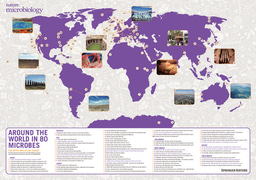Journal Club | Iceman’s stomach bug may shed new light on his origins
Published in Microbiology
Did Oetzi the Iceman, a 5300 year-old Copper Age mummy discovered in the Alps in 1991, have a stomach bug when he died? This is the question the press have been asking this week given recent findings published by Maixner and colleagues in Science where they identify Helicobacter pylori in his stomach contents. Today, H. pylori is one of the most prevalent human pathogens causing stomach ulcers and gastritis, hence the questions from the press about this guy’s tummy upsets.
However, this research may also provide new clues about the wider migration of humans during the Copper Age. Interestingly, the strain found in Oetzi is most similar to that found in Central and South Asia today. Today’s European strain is a combination of African and Asian strains, suggesting that sometime after Oetzi’s death a second wave of migration from Africa came to Europe, bringing their H. pylori strain with them.
With each new paper we learn a little more about the Iceman, the way he lived, and his origins; I’m sure there is still more to come.
Maixner et al’s Science paper was covered in a number of news outlets such as the BBC, Science Daily, Scientific American, The Washington Post and National Geographic.





Please sign in or register for FREE
If you are a registered user on Research Communities by Springer Nature, please sign in